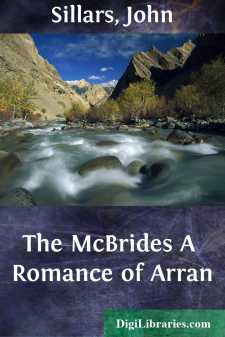Categories
- Antiques & Collectibles 13
- Architecture 36
- Art 48
- Bibles 22
- Biography & Autobiography 813
- Body, Mind & Spirit 142
- Business & Economics 28
- Children's Books 15
- Children's Fiction 12
- Computers 4
- Cooking 94
- Crafts & Hobbies 4
- Drama 346
- Education 46
- Family & Relationships 57
- Fiction 11828
- Games 19
- Gardening 17
- Health & Fitness 34
- History 1377
- House & Home 1
- Humor 147
- Juvenile Fiction 1873
- Juvenile Nonfiction 202
- Language Arts & Disciplines 88
- Law 16
- Literary Collections 686
- Literary Criticism 179
- Mathematics 13
- Medical 41
- Music 40
- Nature 179
- Non-Classifiable 1768
- Performing Arts 7
- Periodicals 1453
- Philosophy 64
- Photography 2
- Poetry 896
- Political Science 203
- Psychology 42
- Reference 154
- Religion 513
- Science 126
- Self-Help 84
- Social Science 81
- Sports & Recreation 34
- Study Aids 3
- Technology & Engineering 59
- Transportation 23
- Travel 463
- True Crime 29
The McBrides A Romance of Arran
by: John Sillars
Categories:
Description:
Excerpt
CHAPTER I.
WHICH TELLS OF THE COMING OF THE GIPSY.
It was April among the hills, waes me, the far-away days of my youth, when the hills were smiling through the mists of their tears, and the green grasses thrusting themselves through the withered mat of the pasture like slender fairy swords. April in the hills, with the curlews crying far out on the moorside, past the Red Ground my grandfather wrought, and where again the heather will creep down, rig on rig, for all the stone dykes, deer fences, and tile drains that ever a man put money in. I never knew why it was they called it "Red Ground," for it was mostly black peaty soil, but my grandfather would be saying, "It will be growing corn. Give it wrack, and it will be growing corn for evermore."
They tell me he was a great farmer for all he was laird, and never happier than at his own plough tail, breaking a colt to work in chains; and he it was who improved the stock in cattle and horse in our glens, for he would be aye telling the young farmers, "Gie the quey calves plenty o' milk, as much as they'll lash into themselves. Be good to them when the baby flesh is on them, and they'll grow and thrive, and your siller'll a' come back in the milking."
The countryside clavered and havered when he bought his pedigree bulls and his pedigree mares. "It's money clean wasted," said the old farmers, "for a calf's a calf no odds what begets it, and a horse that can work in chains and take its turn on the road is horse enough for any man, without sinking money in dumb beasts, and a' this sire-and-dam pother." It would anger the old man that talk, ay, even when he was the old frail frame of what once he was,—like a dead and withered ash-tree, dourly awaiting the death gale to send it crashing down, to lie where once its shade fell in the hot summer days of its youth,—and the blood would rise up on his neck, where the flesh had shrunk like old cracked parchment, and left cords and pipes of arteries and veins, gnarled like old ivy round a tree.
Querulous he was and ill-tempered with the scoffers. "Man, if I had twenty more years I would grow hoofs on your horse and udders on your in-coming queys." Well, well, I'm fond of this farming, but I have set out to tell a tale, which in my poor fancy should even be like a rotation of crops, from the breaking in of the lea to the sowing out in grass, with the sun and winds and sweet rains to ripen and swell the grain—the crying of the harvesters and the laughing of lassies among the stocks in the gloaming, the neighing of horse and the lowing of kine in the evening.
On that morning so long ago Dan and I were ploughing stubble, and I followed my horses in all joy, laughing to see them snap as I turned them in at the head-rigs, and coaxing them as they threw their big glossy shoulders into the collar on the brae face. So the morning wore on as I ploughed, with maybe a word now and then to Dick, and a touch of the rein to Darling, and the sea-gulls screaming after us as the good land was turned over....


